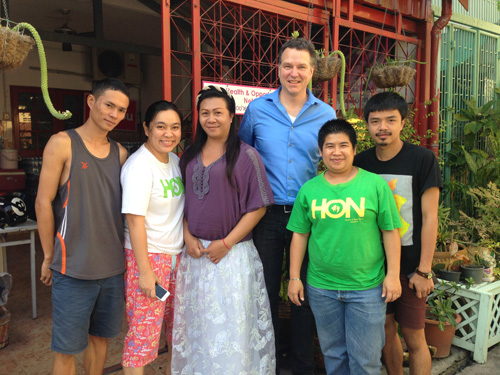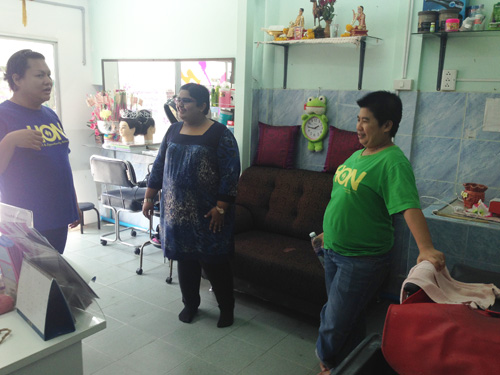Posted by Kent Klindera on November 18, 2013

GMT Initiative Director Kent Klindera (fourth from right) meets with members of the Health and Opportunity Network (HON) in Pattaya, Thailand.
I just finished up a week of meeting with various organizations and individuals involved in the trans* health and rights movement in Thailand. It was a bit of a homecoming for me, as over 20 years ago I lived as a Peace Corps volunteer in rural Northeastern Thailand for four years. Back then, trans women where accepted in small towns and villages. They often assumed societal roles typically ascribed to women (e.g., beauticians, seamstresses, nurses, etc.). However, while they appeared to be tolerated within society, this tolerance was only on the surface. They often were the brunt of jokes and were highly stigmatized and discriminated against in educational and employment settings.
 A condom dress that will be modeled in December during HON’s annual World AIDS Day fashion show. Sadly, 20 years on, not much has changed in Thailand. The women continue to face pervasive stigma and discrimination—which often fuels HIV risk behavior. Newly emerging epidemiological data indicate HIV rates among trans women are much higher than among the general population. They also have biological risk factors that contribute to this rate, based on anal sexual behavior that is 19 times more likely to transmit HIV than vaginal intercourse. Because of the stigma, very few health services exist that are appropriate for trans individuals, which deters many women from seeking out HIV care and testing and other services.
A condom dress that will be modeled in December during HON’s annual World AIDS Day fashion show. Sadly, 20 years on, not much has changed in Thailand. The women continue to face pervasive stigma and discrimination—which often fuels HIV risk behavior. Newly emerging epidemiological data indicate HIV rates among trans women are much higher than among the general population. They also have biological risk factors that contribute to this rate, based on anal sexual behavior that is 19 times more likely to transmit HIV than vaginal intercourse. Because of the stigma, very few health services exist that are appropriate for trans individuals, which deters many women from seeking out HIV care and testing and other services.
However, during my visit, I saw signs that progress is being made. I met up with a current GMT Initiative grantee, the Health and Opportunity Network (HON), based in Pattaya, about two hours Southeast of Bangkok. The HON focuses on the health and social needs of sex workers, including trans sex workers. They offer social support, a trans friendly health center, and vocational and academic training opportunities. With amfAR support, they are now implementing activities to advocate for the Thai government’s public health and social service system to offer more trans-appropriate services. They hope that soon the Thai government will be supporting them in their community-run efforts.
I also met with many other activists to gain clarity on the best way amfAR could invest additional funds into achieving policy reform to decrease HIV vulnerabilities for this population. Almost everyone I talked to discussed the legal challenges of gender reassignment, including that not being able to legally change one’s gender was a huge challenge—and a contributing factor in why trans women are not seeking HIV services, as they are not treated with appropriate services for their gender identity.

amfAR’s Noweed Charles (center) talks with members of HON.
I was most impressed with the Thai Transgender Alliance’s efforts to use sociological research to guide their advocacy efforts. They had just come off of a major victory working with the Thai military to end a discriminatory conscription policy that labeled trans women as “mentally unstable” because they were unable to serve in the military. This label went into the permanent records of these individuals, which inhibited many from gaining meaningful employment and educational opportunities.
I witnessed a trans movement set to achieve even greater policy goals, and I leave Thailand with much greater insight and hope about trans health and human rights issues. I’m so excited amfAR is a part of this effort, as we work to eventually impact the HIV rates among this vulnerable population.
* The terms ‘trans’ is used as an umbrella term, grouping together a variety of people with different identities who don’t really fit within their society's standards of how women and men are supposed to look and act (in other words, they're "gender non-conforming").